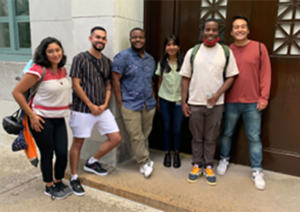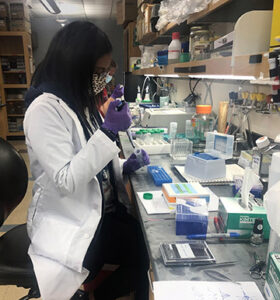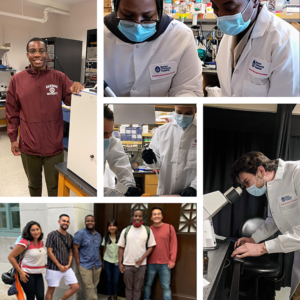Creating a Pipeline into Neuroscience
Two Promising Diversity Programs
July 28, 2022
By Sylvia Lewinstein, MPA, Intellectual and Developmental Disabilities Center
with contributions by Dr. Michael T. Do, Boston Children’s Hospital and Dr. Robert Datta, Harvard Medical School
The field of neuroscience lacks diversity, and the pool of students looking to enter it is no different. There are many reasons for this, but the most essential one is the grim fact that generations of people from diverse backgrounds have not been afforded the same opportunities in the sciences as the broader population. Increasing the diversity of the neuroscience field is not only the right thing to do, but it will also bring about multiple perspectives, even more talent, and a variety of voices that can only serve to enrich it.
Two exciting programs in Neuroscience at Harvard and BCH, both led by Intellectual and Developmental Disabilities Center (IDDRC) investigators, are doing something about this: the PinBAC Program of Harvard University and the Kirby-IBRO Internships of Boston Children’s Hospital.
Harvard PiNBAC Program
Co-led by Dr. Tari Tan and IDDRC member Dr. Robert Datta, the Harvard Program in Neuroscience’s Post-Bac (PiNBAC) has since 2021, offered recent college graduates from underrepresented groups the opportunity to conduct research in neuroscience labs at Harvard and gain the professional skills they will need to succeed in graduate school, all while receiving a yearly stipend and other resources.
As part of Harvard’s Research Scholar Initiative, PiNBAC offers longitudinal science curriculum, individualized professional development,

Image by Elisa Rojas Palato
and assistance in graduate applications.
During this 1–2-year program, students will conduct an individual research project in a neuroscience lab at Harvard, receive specialized mentorship from neuroscience faculty, and actively participate in events hosted by the Harvard neuroscience community. As Dr. Datta explains:
The PiNBAC program has been a really terrific experience for both the students and mentors. It has been so gratifying to see these young scholars get bitten by the research bug, and to watch them grow as scientists.
BCH through the Kirby Neurobiology Center is currently hosting two PiNBAC students: Eric Garcia in the Beth Stevens Lab, and Elisa Palato in the Michael Do Lab.
See recent Harvard Medical School article for additional information: https://hms.harvard.edu/news/steeped-research
Kirby-IBRO Internships of Boston Children’s Hospital
The F.M Kirby Neurobiology Center and International Brain Research Organization (IBRO)
The Kirby-IBRO Internships of Boston Children’s Hospital, co-directed by IDDRC members Dr. Michael Do and Dr. Michela Fagiolini, pairs students with labs in the F.M. Kirby Neurobiology Center of Boston Children’s Hospital for semester-long research internships. Students come to the program from Bunker Hill Community College (BHCC), earn college credit through BHCC’s Learn and Earn Program, and receive a stipend. Internships are fully supported by the F.M. Kirby Foundation, IBRO, Boston Children’s Hospital, and BHCC. Members of the F.M. Kirby Neurobiology Center, working with Workforce Development and other departments of Boston Children’s Hospital, established this program in 2021.
The internship has three main components: a bootcamp for orientation to science and the workplace, a weekly workshop for the development of research and career skills, and a research project.

Image by Alicia Walker
The bootcamp and workshops are developed and taught by dedicated volunteers of the F.M. Kirby Neurobiology Center and the Intellectual and Developmental Disabilities Center. For the research project, interns are immersed in host labs, where they pursue their scientific curiosities under the guidance of the principal investigator, a designated mentor within the lab, and other lab members. Interns seek new knowledge in areas that include the nervous system’s basic workings, diseases, and treatments. The semester ends with a celebratory poster session in which interns present their research. Interns obtain deep experiences of science and gain new colleagues; in turn, they invigorate the field with their perspectives and efforts.
The program has completed two semesters, providing part-time internships to ten interns selected from highly competitive pools. These interns have been successful; for example, about half were hired by their host labs to continue their research beyond the semester. A former student, Kendra Morrison (Michael Do’s lab), says:
Racial and ethnic minorities, the uninsured, low-income families, and other vulnerable populations are posed with unique challenges that make access to quality healthcare strenuous. By pursuing a career as a physician, I can combine my commitment to health equity, desire to be of service to others, and love for science into helping individuals, especially those from underserved communities, improve their health and well-being. My experience with the program established my foundation for research, one of the most important catalysts for medical advancement. BCH is one of the most supportive and diverse working environments I have encountered thus far. I could not have asked for a better first research experience.
Currently in its summer phase, seven interns are conducting full-time research on topics ranging from the assembly of complex tissues to biological clocks: Arianna Bethea (Maria Lehtinen’s lab), Tiffany Gosheff (Alex Rotenberg’s lab), Nevalee Hawkins (Animal Behavior and Physiology Core), Drew Nelson (Clifford Woolf’s lab), Isabel Rodriguez (Hisashi Umemori’s lab), Melissa Roe (Jonathon Lipton’s lab), and Zahraa Salloum (Xi He’s lab).
For more information visit, please contact Michael Do (michael.do@childrens.harvard.edu) or visit the Kirby-IBRO Internship program.
We look forward to seeing these programs continue to grow and we wish these bright and promising students all the best in their career paths.



